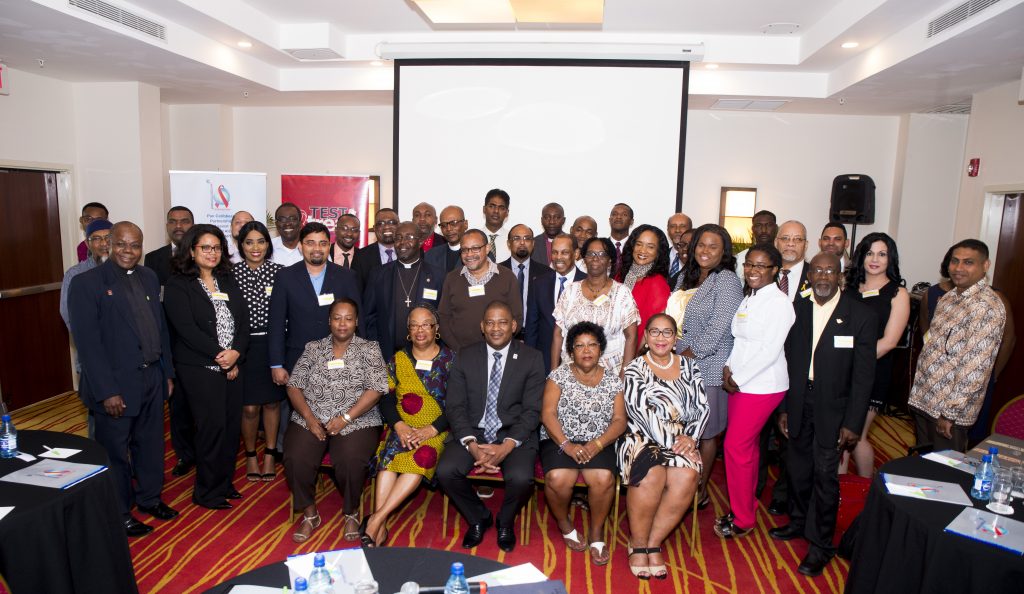
H.E. Patrick Pengel, Minister of Public Health, Suriname lauds Key Populations and Faith Leaders DialogueCalls for partnership between key populations and other stakeholders to bridge gaps in access to HIV prevention and treatment
Wednesday, February 7 2018 (PANCAP Coordinating Unit, CARICOM Secretariat): The Pan Caribbean Partnership against HIV and AIDS (PANCAP), the mechanism that provides a structured and unified approach to the Caribbean’s response to the HIV epidemic, hosted H.E. Patrick Pengel, Minister of Public Health, Suriname at the opening of the Caribbean Regional Consultation of Key Populations and Religious Leaders on the Right to Health and Wellbeing for All in Paramaribo, Suriname, Wednesday, February 7.
In his feature address, His Excellency Patrick Pengel praised the initiative and stated that he was proud that Suriname is host to one of the first consultations between faith leaders and key populations in the Region. The key populations included sex workers, the LGBT community, the transgender community and youth.
“The Government of Suriname is honored that PANCAP brought this dialogue between Regional Faith Leaders and Regional Key Population Leaders to Suriname,” stated the Minister, “Suriname is known for its peaceful co-existence of a multi-ethnic, multi-religious population. It is our pride and our benchmark and will prove to be a fertile environment for this dialogue”.
He referred to the progress made in the world in the fight against HIV including the fact that 19.5 million people are reportedly now accessing anti-retroviral treatment but underscored that there are still another 17 million people left to access treatment.
The Minister posited “in Suriname, there are 2400 persons on treatment, this is a 60% increase from 2014 and the gap of persons still needing treatment is expected to swiftly decline as Suriname has officially committed to ‘Treat All’ on World AIDS Day 2017. However, there remains a gap of more than 40% of persons living with HIV in Suriname not accessing treatment. At least another 40% of persons living with HIV will be added to this number before this gap is sufficiently bridged”.
The Minister stated that the Region is progressing in eliminating Mother-to-Child Transmission of HIV and Syphilis (EMTCT). He applauded the six Caribbean countries validated for EMTCT during the past World AIDS Day and stated that he is motivated by this achievement to work towards Suriname’s validation.
However, he warned that amidst these successes in the Caribbean, there are gaps that exist in access to treatment and prevention of HIV with regard to Men having Sex with Men, transgender, sex workers, youth at risk, women, elders, and persons who use drugs.
The Minister linked these gaps to the fear of stigma and discrimination by key populations. He stated, “Key populations are part of our communities. They are our brothers, sisters, sons, daughters, colleagues, sport team members, our fellow churchgoers, our fellow human beings, they are us. Key populations are part of our communities. They are religious, they live, love, work, and contribute to our societies.
We are aware of the challenges existing between religious teachings and non-alignment with certain behaviors. We are not here to deny that gap, to force alliance no matter what. But we do think compassion for all and the opportunity of consolation through religion is a basic human right”.
The Minister further posited, “Religion is often a fundamental part of the life of human beings, certainly in our Caribbean Region. Even more so in those that are marginalized and ill. In illness, even non-religious persons often seek closure and healing in faith.
Thus, it is even more important to have faith leaders included in the discussion on the prevention and care of HIV. Even more important to have faith leaders informed about the facts and the myths in HIV care. Even more important to have faith leaders supporting messages that advocate for health”.
The Minister concluded by endorsing the engagement between faith leaders and key populations for creating a positive environment for partnerships between stakeholders in order to bridge gaps in universal access to health in general and specifically gaps in HIV and AIDS health services. “The Government of Suriname wishes to emphasize how honored and proud we are for having been chosen as a hosting location for this Regional Dialogue”, stated the Minister, “We are convinced that at the end of this consultation we will have closer alliances between all stakeholders involved, ensuring we are leaving no one behind on our journey to 90-90-90 and the right to health for all”.
– ENDS –
What is PANCAP?
PANCAP is a Caribbean regional partnership of governments, regional civil society organizations, regional institutions and organizations, bilateral and multilateral agencies and contributing donor partners which was established on 14 February 2001. PANCAP provides a structured and unified approach to the Caribbean’s response to the HIV epidemic, coordinates the response through the Caribbean Regional Strategic Framework on HIV and AIDS to maximise efficient use of resources and increase impact, mobilises resources and build capacity of partners.
What are the Joint United Nations Programme on HIV and AIDS (UNAIDS) 90-90-90 Targets?
• By 2020, 90% of all people living with HIV will know their HIV status.
• By 2020, 90% of all people with diagnosed HIV infection will receive sustained antiretroviral therapy.
• By 2020, 90% of all people receiving antiretroviral therapy will have viral suppression.
Contact:
Timothy Austin
Communications Specialist
PANCAP Coordinating Unit
CARICOM Secretariat
Turkeyen, Greater Georgetown, Guyana
Email: taustin.consultant@caricom.org
Tel: (592) 222-0001-75, Ext. 3409 | Visit www.PANCAP.org
